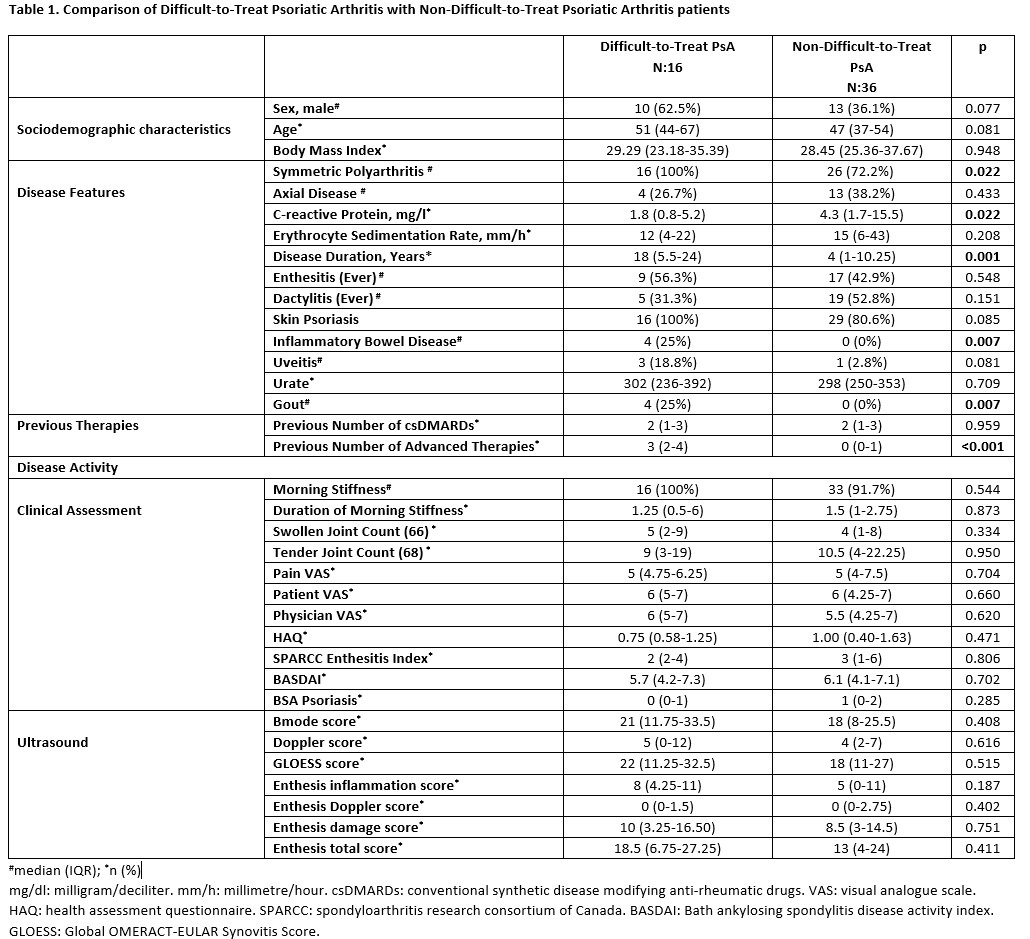Session Information
Date: Saturday, November 16, 2024
Title: Imaging of Rheumatic Diseases Poster I: Inflammatory Arthritis
Session Type: Poster Session A
Session Time: 10:30AM-12:30PM
Background/Purpose: In the era of several advanced therapies and an increased number of patients with psoriatic arthritis (PsA) who have been failed by multiple treatment options, a better understanding of Difficult-to-Treat (D2T) PsA is essential and timely. In this analysis, we aimed to explore the D2T PsA patient phenotype, by comparing the clinical features, comorbidities, and ultrasonographic features of peripheral arthritis and enthesitis domains with non-DT2 PsA, to understand factors contributing to the D2T state.
Methods: Patients were recruited from the ORCHESTRA (Ottawa Rheumatology CompreHEnSive Treatment and Assessment) Clinic, where all patients with inflammatory arthritis who are about to initiate a new advanced therapy are assessed using a standardized protocol including disease features, medications, comorbidities, and clinical disease activity measures. A protocoled ultrasound (US) was performed including 44 joints for synovitis and 14 entheses for enthesitis. Synovitis was scored using the Global OMERACT-EULAR Synovitis Score (GLOESS). Elementary lesions of enthesitis included hypoechogenicity, thickening, and power Doppler signals (features of inflammation) and erosions, calcifications, and enthesophytes (features of damage), all being on a scale of 0-3 (none-mild-moderate-severe). Relevant features were summed to reach inflammation, damage, and total enthesitis scores per patient. For this analysis, D2T PsA definitions were extrapolated from the EULAR definition of D2T Rheumatoid Arthritis. (1) Patients who fulfilled the D2T PsA definition were compared with the patients who did not fulfill (non-D2T).
Results: Among 52 PsA patients, 16 (30.8%) fulfilled the definition of D2T PsA. Demographics were similar between the two groups, except the male sex being numerically higher in D2T PsA patients (n=10/16 (62.5%) vs n=13/36 (36.1%); p=0.077) and having longer disease duration (table 1). Disease activities were similar between groups, both clinically and on US, and CRP levels were even lower in D2T PsA patients (p=0.022). Gout and inflammatory bowel disease were statistically higher in D2T PsA patients than non-D2T group (table 1).
Conclusion: There were no clinical and ultrasonographic differences in peripheral arthritis and enthesitis domains between patients with D2T and non-D2T PsA. In our patient population, comorbidities, gout, and inflammatory bowel disease seem to be associated with D2T state, but not necessarily a higher disease burden.
To cite this abstract in AMA style:
Sabido-Sauri R, Acikgoz S, Bayindir Tsechelidis O, Gazel U, Sangwa S, Hepworth E, Aydin S. A Comparative Study of Difficult-to-Treat vs Non-Difficult-to-Treat Psoriatic Arthritis for Disease Burden and Comorbidities: An Ultrasound Study [abstract]. Arthritis Rheumatol. 2024; 76 (suppl 9). https://acrabstracts.org/abstract/a-comparative-study-of-difficult-to-treat-vs-non-difficult-to-treat-psoriatic-arthritis-for-disease-burden-and-comorbidities-an-ultrasound-study/. Accessed .« Back to ACR Convergence 2024
ACR Meeting Abstracts - https://acrabstracts.org/abstract/a-comparative-study-of-difficult-to-treat-vs-non-difficult-to-treat-psoriatic-arthritis-for-disease-burden-and-comorbidities-an-ultrasound-study/

